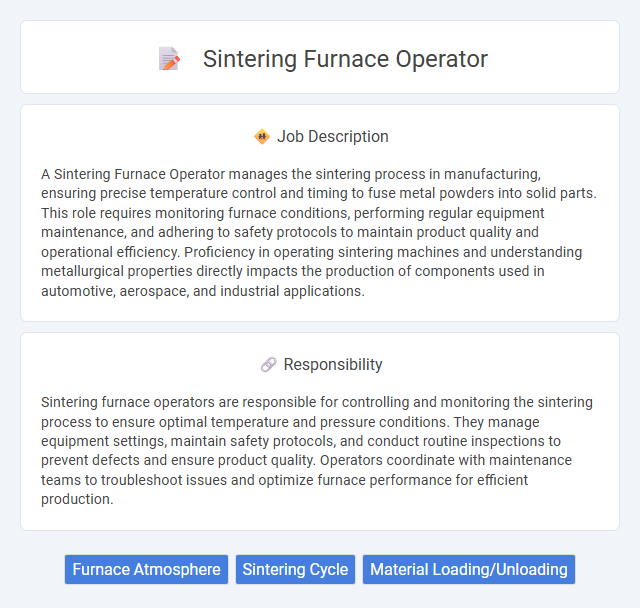
A Sintering Furnace Operator manages the sintering process in manufacturing, ensuring precise temperature control and timing to fuse metal powders into solid parts. This role requires monitoring furnace conditions, performing regular equipment maintenance, and adhering to safety protocols to maintain product quality and operational efficiency. Proficiency in operating sintering machines and understanding metallurgical properties directly impacts the production of components used in automotive, aerospace, and industrial applications.
Individuals with strong attention to detail and the ability to work in high-temperature environments are likely well-suited for the role of a sintering furnace operator. Those who can maintain focus during repetitive tasks and possess good mechanical skills may find this job fitting due to the precision required in controlling furnace settings. People with respiratory sensitivities or difficulty working in confined spaces might face challenges adapting to this work environment.
Qualification
A Sintering Furnace Operator must possess a high school diploma or equivalent, with vocational training in metallurgy or materials science preferred. Proficiency in operating and monitoring sintering furnace equipment, along with a solid understanding of temperature control and safety protocols, is essential. Experience in a manufacturing or foundry environment enhances the ability to manage furnace cycles and ensure product quality.
Responsibility
Sintering furnace operators are responsible for controlling and monitoring the sintering process to ensure optimal temperature and pressure conditions. They manage equipment settings, maintain safety protocols, and conduct routine inspections to prevent defects and ensure product quality. Operators coordinate with maintenance teams to troubleshoot issues and optimize furnace performance for efficient production.
Benefit
Working as a sintering furnace operator may likely offer competitive wages and opportunities for shift differentials, enhancing overall income. Benefits often include health insurance, retirement plans, and paid time off, contributing to financial security and work-life balance. On-the-job training and skill development may increase chances of career advancement within the manufacturing sector.
Challenge
The role of a sintering furnace operator likely involves managing complex temperature controls and precise timing to ensure optimal material bonding. Operators probably face challenges related to maintaining consistent furnace conditions while minimizing downtime and energy consumption. Troubleshooting equipment malfunctions and ensuring safety protocols are also expected to be significant aspects of the job.
Career Advancement
Sintering furnace operators play a crucial role in metallurgical manufacturing by controlling high-temperature processes that fuse powdered metals into solid components, ensuring product quality and efficiency. Career advancement opportunities include progressing to senior operator, process supervisor, or production manager roles, often requiring technical certifications and experience in furnace technology and materials science. Developing expertise in furnace maintenance, quality control, and process optimization enhances prospects for leadership positions within manufacturing and industrial sectors.
Key Terms
Furnace Atmosphere
A sintering furnace operator carefully controls the furnace atmosphere to ensure optimal chemical reactions during the sintering process. Maintaining the correct balance of gases like nitrogen, hydrogen, and argon is critical to prevent oxidation and achieve desired material properties. Precise atmosphere regulation directly affects the density, strength, and microstructure of the sintered components.
Sintering Cycle
A Sintering Furnace Operator manages the sintering cycle to transform powdered materials into solid, durable objects through controlled heating below melting points. Precise monitoring of temperature profiles, atmosphere control, and timing during the sintering cycle is critical for achieving optimal material density and mechanical properties. Expertise in adjusting furnace parameters ensures energy efficiency while maintaining product quality and consistency in industrial manufacturing processes.
Material Loading/Unloading
Sintering furnace operators oversee the precise loading and unloading of materials to ensure optimal furnace performance and product quality. Accurate handling of metal powders and raw materials during these processes minimizes contamination and maintains consistent sintering cycles. Expertise in managing temperature-sensitive materials and adhering to safety protocols is crucial for preventing defects and maximizing production efficiency.
 kuljobs.com
kuljobs.com